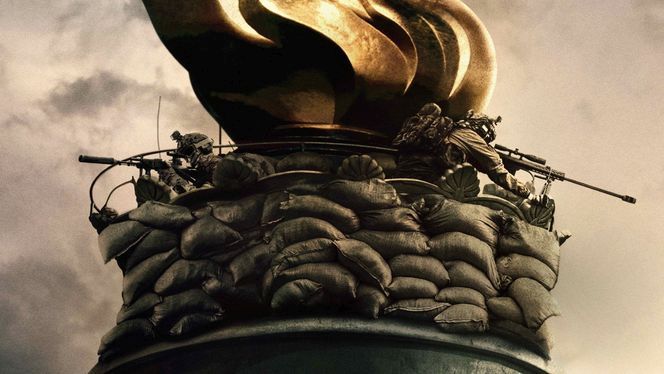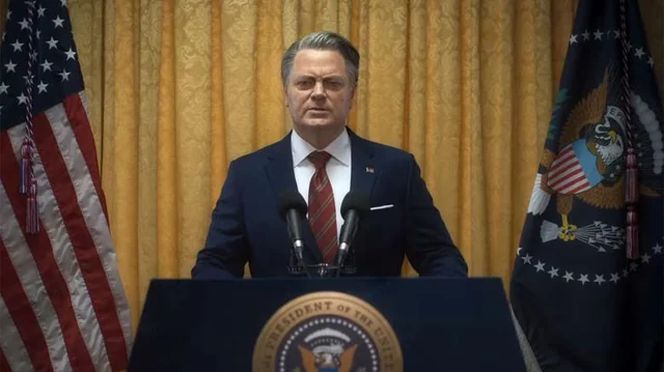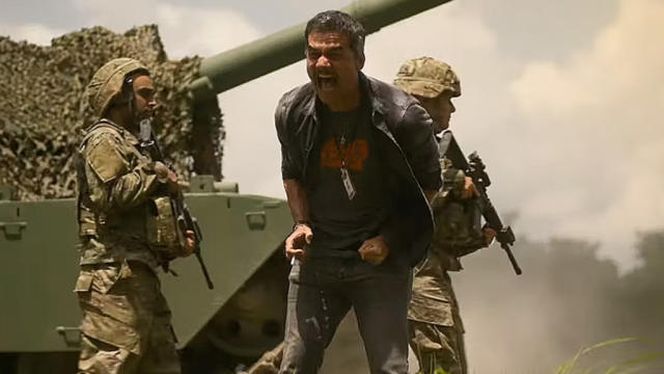MOVIE REVIEW – Alex Garland’s stunning new film, Civil War, is set to become a centerpiece for numerous filmic and political analyses, undoubtedly ranking as one of this year’s most pivotal movies. From the onset of the season, it has climbed to the forefront as one of the year’s most prominent works, delivering a harrowing reminder: regardless of the nobility of its cause, war is inherently hellish. Civil War shifts focus from the origins of conflict to the immediate, devastating consequences of warfare. Throughout the film, the “Western Forces” target the White House, advancing across the American East Coast and transforming quaint towns into scenes of bloody conflict.
Garland’s film conjures a fictional, alternate wartime nightmare, portrayed in a reality that could exist just after the turn of the millennium or in the near future. Given the current global political climate and the American election season, this vision unfortunately no longer seems far-fetched. The English director delivers a frighteningly perceptive warning, depicting a changed world—including New York—where a brutal and bloody civil war in the United States is not science fiction, but a painfully tangible reality. Various armed forces wage desperate battles, while the terrorized populace tries to adapt to new circumstances akin to those of the COVID era. In some places, like a small town or a luxury hotel, life continues under the guise of normalcy, thanks to numerous security measures and the transformation of business practices.
Moreover, Civil War is a masterfully directed political thriller that excels in spectacle and tension. Utilizing the IMAX format, the film centers on the cynical violence of wartime scenes. Garland’s creation also serves as an urgent warning, becoming particularly menacing as the U.S. elections draw near, calling for peace and offering a critique of the media, which both starkly depicts contemporary history and unabashedly serves a violence-craving audience.
The President’s Lies…
The plot unfolds with deceptive simplicity: Civil War begins with a speech from the President of the United States (Nick Offerman), who shares news he himself can scarcely believe. The Western Forces, a secessionist group from Texas and California, have been subdued, and a similar fate awaits a group in Florida. We are soon introduced to Kirsten Dunst’s character, Lee, a war photographer capturing an uprising in New York. Here, New York resembles its post-9/11 state, with certain neighborhoods transformed into frontline zones, while other areas remain unchanged—save for occasional power outages and slow internet.
Garland and his team do not shy away from showing the terrible cost of conflict; the visuals evoke modern battlefields such as Ukraine, Gaza, Bosnia, and Chechnya, where the scale of devastation is nearly unfathomable. In a particularly disturbing scene, an unnamed soldier (played by Jesse Plemons) executes a foreign correspondent without hesitation, then discards the body into a mass grave. This image, particularly on an IMAX screen, is sure to leave a lasting impression. Although Garland does not film in the full IMAX aspect ratio like Nolan or Villeneuve recently did, he maximally exploits the format to achieve a profound impact, creating an epic primarily focused on capturing the horrors of war. Garland portrays hell with a cold objectivity, crafting one of the least multiplex-friendly IMAX pictures imaginable—but it is essential viewing.
Despite its ambitious setup, the scope and scale of Civil War are ultimately quite contained. Massive set pieces, such as downed helicopters in abandoned mall parking lots and the final raid, maintain a narrow focus, leaving much to the audience’s imagination. The film is ultimately about the fog of war, with the alliances and politics of its characters remaining somewhat ambiguous.
“We Just Show the Atrocities, We Don’t Interfere…”
The film is as much a critique of journalism as it is a celebration of the profession. Dunst’s Lee instructs Jessie that their job is merely to report—the events that unfold at the back of a gas station, or elsewhere, will occur whether they are present or not. Veteran reporter Sammy, played by Henderson, offers wise advice to Jessie: sleep when you can, because you never know what’s around the corner. Sammy is a straight-shooter, an honest journalist with decades of frontline experience who calls things as he sees them. As their group heads to Washington to interview the President before the government collapses, he debates with Joel what questions to ask. Joel’s political views remain somewhat murky. After all, history is often written by the victors, but Offerman’s President, who has served three terms and disbanded the FBI, might have offered a premonition of what was to come.
Without explicitly appearing in the script, Civil War paints a dark picture of what could happen if the nation’s institutions become corrupt and are directly controlled by or dissolved under the central power—the American presidency. This includes both legal and civic institutions. The only flaw of the film might be that it portrays this future conflict somewhat simplistically. It feels a bit like Alex Garland is revisiting a realistic apocalypse scenario similar to “28 Days Later,” but without zombies—here, the “zombies” are the people themselves, driven to violence against each other. Dunst’s character, Lee, focuses solely on capturing the bare facts, meanwhile, it’s revealed that she had previously gained recognition for documenting the “ANTIFA massacre.”
Especially Timely…
Civil War can best be described as a stark and detached nightmare. While it may not reach the iconic status of films like “Apocalypse Now,” the decision by the film’s distributors to release this visceral depiction of warfare during an election year makes it exceedingly timely. The upcoming wide release is bound to provoke vigorous debates. However, we can be certain that Civil War, as a harrowing war and political thriller, will haunt us for a long time. We can only hope that the atrocities depicted do not inspire further ideas in autocrats like Vladimir Putin, but rather serve as a somber reminder of the horrific consequences of war, which will eventually reach everyone—even them.
-Gergely Herpai (BadSector)-
Civil War
Direction - 9.6
Actors - 9.2
Story - 9.2
Visuals/Music/Sounds - 9.8
Ambience - 9.2
9.4
AWESOME
Alex Garland's Civil War is a provocative political thriller that sharply captures the grim realities of war, undoubtedly rising as one of this year's most significant cinematic achievements. Released in an election year, its timeliness is enhanced by the current global political tensions and conflicts. The film's shocking impact is expected to ignite lively societal debates, lingering with us long-term while we hope the brutality shown acts more as a warning than an inspiration to autocratic leaders—the conclusion serving as a cautionary tale for them as well.


















Leave a Reply